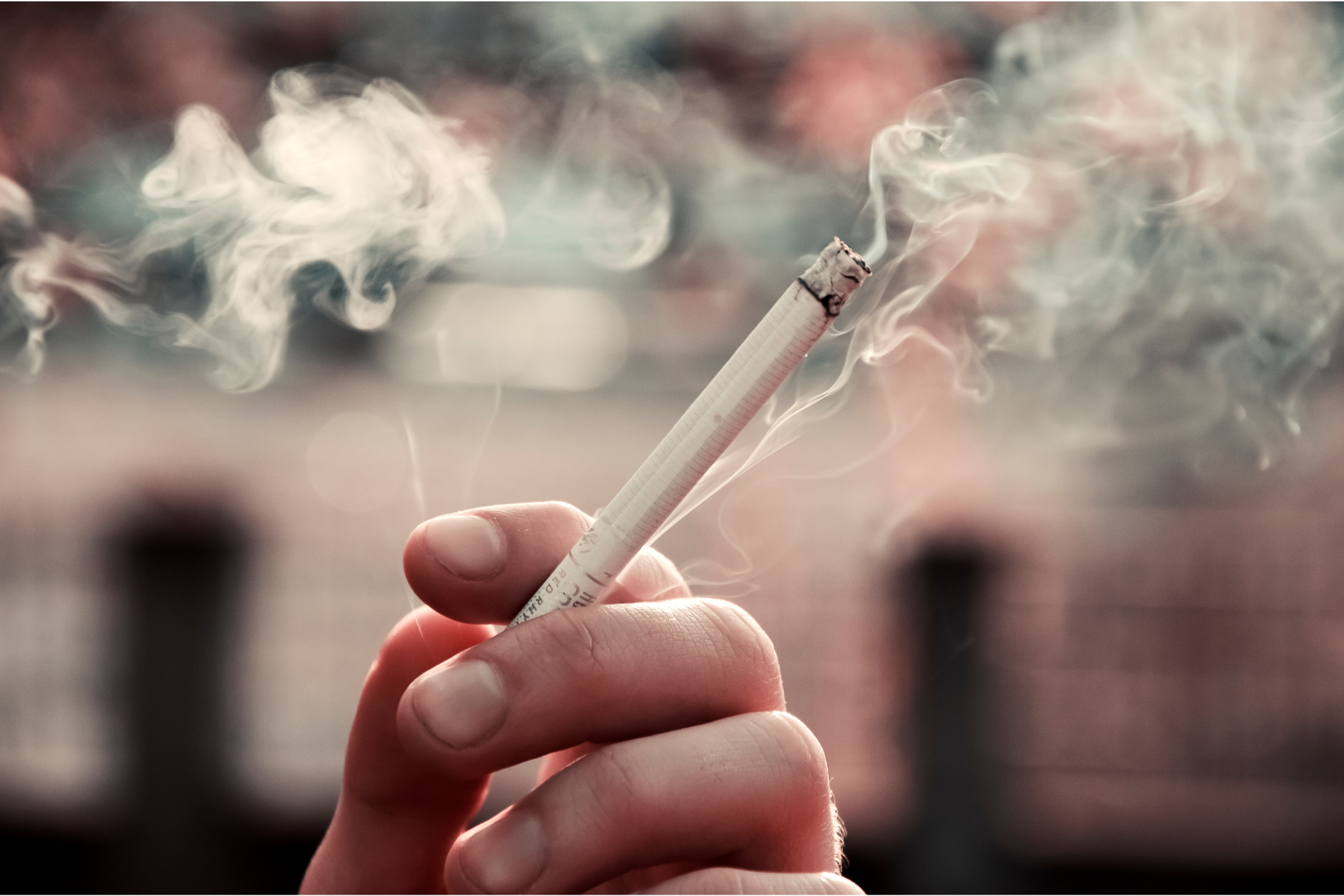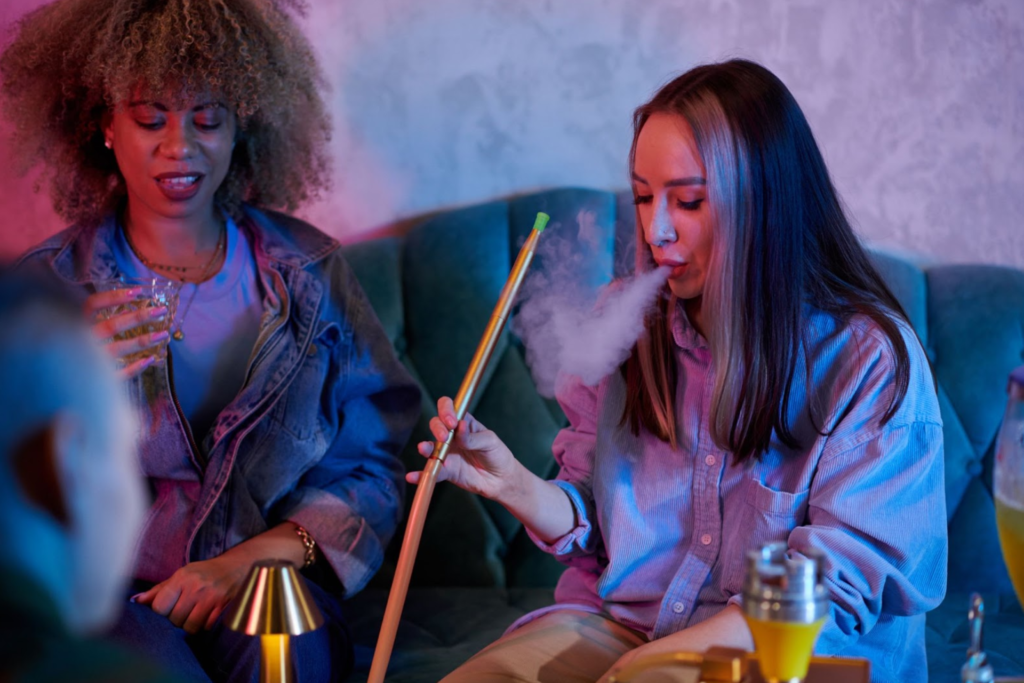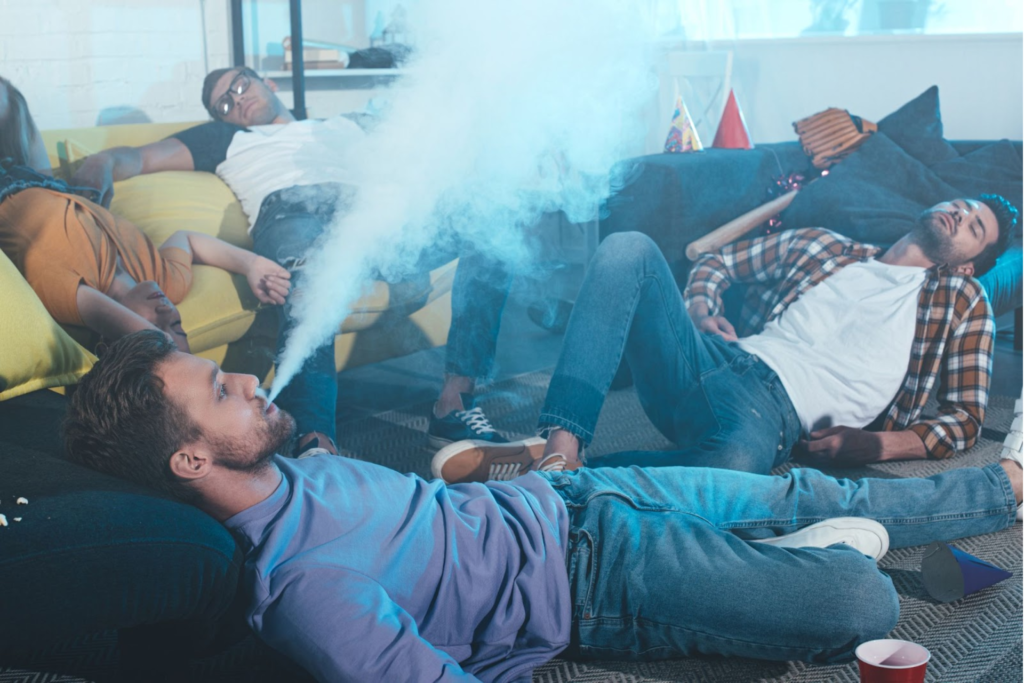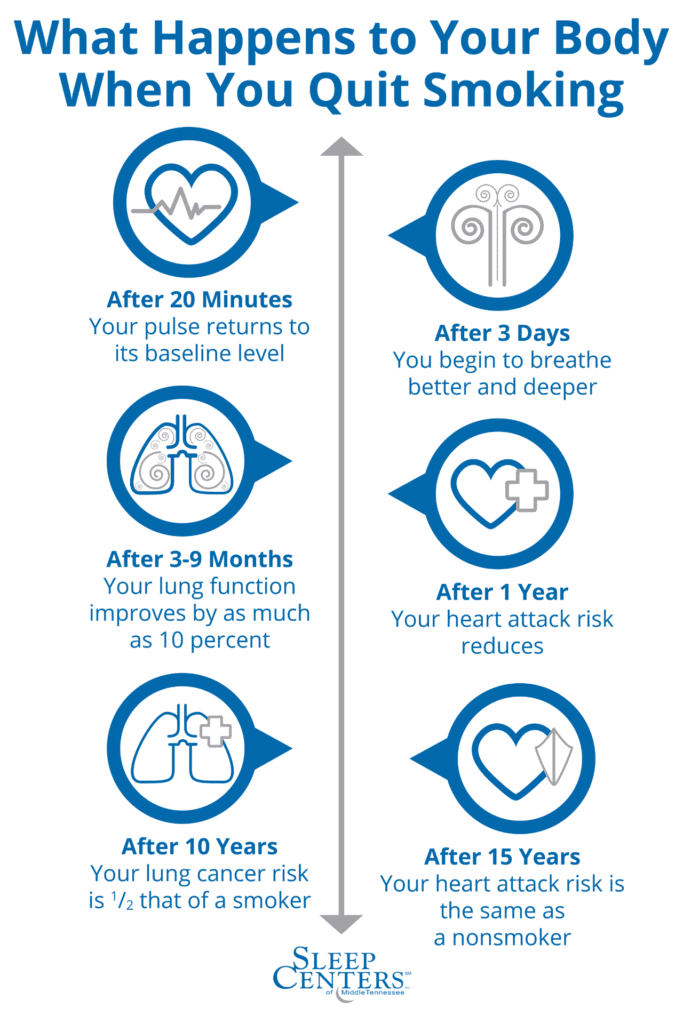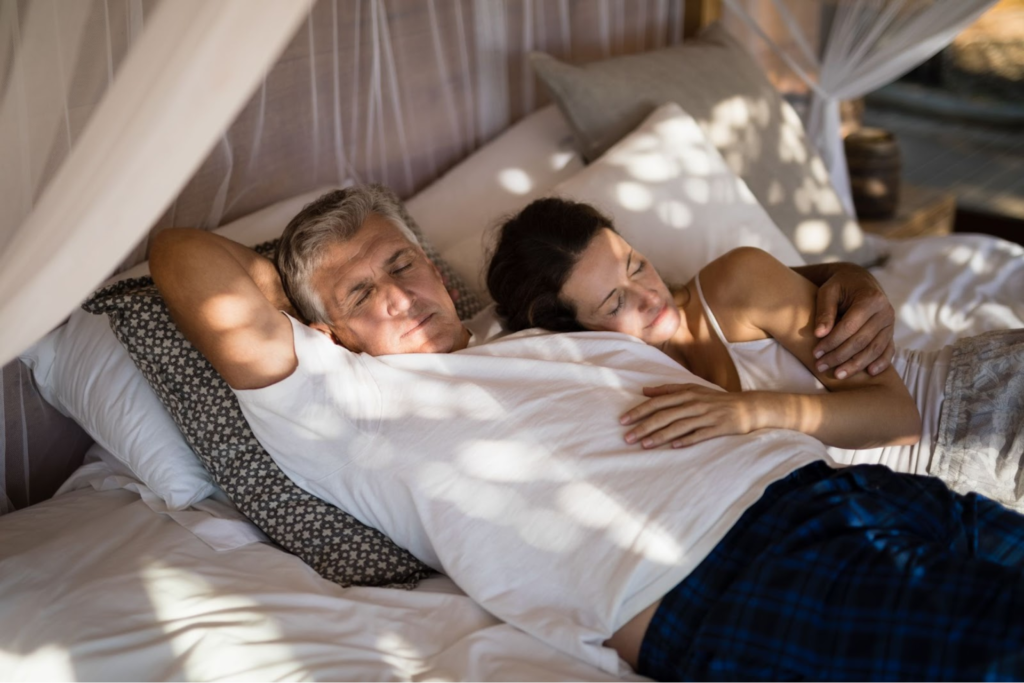It’s well known that smoking causes a lot of health problems, but what’s the relationship between smoking, snoring, and sleep apnea?
While public health campaigns and regulations have made smoking less popular than it once was, nearly 31 million Americans still smoke cigarettes, cigars, or vape (which is often but inaccurately seen as a “healthy” alternative to smoking).
Of course, this drop in numbers is in no small part of the knowledge that smoking and nicotine can cause a huge amount of health problems, including cancer, chronic bronchitis, and difficulty breathing. However, these health problems are still as prevalent as ever, even with fewer people smoking.
But can smoking make it harder for you to get a good night’s sleep?
It can— and it can make sleep-disordered breathing like snoring and pre-existing sleep disorders like obstructive sleep apnea even worse.
What is Obstructive Sleep Apnea?
Obstructive sleep apnea (OSA) is a sleep disorder where your airway is partially (this is called hypopnea) or even completely obstructed while you sleep. The familiar sound of snoring is actually the sound of someone struggling to breathe— this is why snoring is the most well-known symptom of sleep apnea.
However, most people who have obstructive sleep apnea are actually undiagnosed. This is because most sleep apnea symptoms occur while you are sleeping, making them difficult to identify or even know about. These symptoms include:
- Pauses or stops in breathing while you sleep. People with severe OSA can experience 31 or more breathing interruptions in a single hour!
- Loud habitual snoring
- Choking or gasping during sleep
- Excessive daytime sleepiness, or waking up feeling tired even after a full night’s sleep.
- Morning headaches
- Dry mouth or sore throat in the morning
Untreated sleep apnea can cause or worsen other health problems, including:
- Hypertension (high blood pressure)
- Heart disease
- Diabetes
- Obesity
- Erectile Dysfunction
- Acid reflux/GERD
So now you may be wondering, where does smoking figure into this?
How Smoking Can Make Sleep Apnea Worse
More research is still needed to firmly establish the connection between smoking and sleep apnea, but there are a few notable correlations between the two.
Smoking— whether it’s through vapes, cigars, or cigarette smoking— decreases your sleep quality and makes it harder for you to fall asleep. It can also inflame and irritate your upper airway, contributing to sleep apnea symptoms. Smoke exposure causes your upper airways to inflame, obstructing your airway and making breathing more difficult. The more you smoke, the more likely you are to suffer from more severe forms of sleep apnea.
One study from the journal Medicina found that participants with higher nicotine dependence and those who smoked more cigarettes daily or packs yearly were more likely to have obstructive sleep apnea. In fact, more than 60 percent of the study’s participants suffered from moderate to severe OSA. [1]
This study observed 3791 participants, approximately 71 percent male, and 29 percent female. Researchers found that current smokers were 1.2 times more likely to have obstructive sleep apnea than former and never-smokers combined and 1.49 times more likely to have OSA than never-smokers.
This was especially prevalent in people— particularly men— who experienced other health problems like cardiovascular disease. Interestingly, the study found that compared to the women in the study, the men smoked more cigarettes, had greater nicotine dependence, and tended to have more severe OSA.
Current smokers also tended to be diagnosed with obstructive sleep apnea at a younger age when compared to non-smokers.
Can Secondhand Smoke Cause Sleep Apnea?
When you think about sleep apnea, you may associate it with middle-aged, elderly, or overweight adults. But adults aren’t the only people who can get obstructive sleep apnea.
4 percent of children have obstructive sleep apnea, although, unlike OSA in adulthood, this typically resolves on its own. However, sleep disorders in children should always be treated to limit their risk of future health problems. This is especially true if they’re exposed to secondhand smoke in their day-to-day lives.
According to a study by the International Journal of Pediatric Otorhinolaryngology, children with severe sleep apnea who were exposed to secondhand smoke had a higher risk of apnea and hypopnea than those who weren’t exposed to secondhand smoke. [2]
Can Marijuana Help With Sleep Apnea?
Many people struggling to get a good night’s sleep turn to use marijuana to help them get the rest they need each night. And while cannabis can help you sleep thanks to its sedative effect and its anxiety-reducing properties, you should avoid it if you have sleep apnea.
According to the American Academy of Sleep Medicine, there is insufficient evidence of marijuana’s effectiveness and safety when treating sleep apnea. And similar to smoking tobacco, marijuana smoke can also contribute to your sleep apnea symptoms by irritating and inflaming your airways.
Also, there are risks to using cannabis as a sleep aid. Long-term use of marijuana can cause your body to develop a tolerance to its sedative effects. When this happens, you’ll require a higher dose to achieve the same results that aided your sleep previously. Prolonged use can also cause sleep problems like:
- Taking longer to fall asleep
- Shorter sleep duration
- Reduced deep sleep
- Waking up more than once during the night
Note: Medical and recreational marijuana usage is illegal in Tennessee. However, full-spectrum CBD products are legal to obtain and use statewide.
What About Vaping?
Vaping may seem like a safer alternative to smoking cigarettes because instead of inhaling smoke, you’re inhaling water vapor, flavoring, and nicotine. However, it isn’t any safer for you and can still cause sleep problems.
Vapes still contain nicotine, which can inflame your airways, and affect your sleep cycle just as cigarette smoke can. Nicotine also has a stimulant effect on your body, which can make it harder to fall asleep on time. Not only that, but vaping can stimulate your upper airway muscles and make breathing even more difficult if you have sleep apnea. [4]
In short: Nicotine will impact the way you sleep, regardless of how you ingest it.
Want to Improve Your Sleep Apnea Symptoms and Breathe Better? Quit Smoking
Getting a good night’s sleep is difficult when you can’t breathe. Quitting smoking can have a profound impact on your overall health, in addition to the improvement of your sleep apnea symptoms.
Research has found that those who quit smoking have better quality sleep than those who do now.
Related: How to Sleep Better with COPD
CPAP Therapy: The Best Treatment for Sleep Apnea
While kicking the nicotine habit can improve your sleep apnea symptoms, it won’t resolve them.
The only way to fully treat your sleep apnea symptoms is with continuous positive airway pressure or CPAP therapy. CPAP therapy is the most commonly prescribed treatment for obstructive sleep apnea— because it’s also the most effective.
CPAP opens up your obstructed airways with a continuous stream of pressurized air, allowing you to breathe normally and sleep peacefully throughout the night.
CPAP therapy can also help reverse the adverse health effects created by sleep apnea, meaning that using CPAP to treat your sleep apnea can help your cardiovascular health, your mental health, and even your sexual health.
Where There’s Smoke…
Whether you smoke cigarettes, cigars, or vape, you’re putting yourself at risk of a lot of health problems, including poor sleep and sleep apnea. Regardless of where it comes from, consuming nicotine in any form can harm your sleep.
If you already snore or have sleep apnea, you’re actively worsening your symptoms with the smoke and nicotine. Thankfully, you can improve your symptoms and sleep better by kicking the habit and adhering to your CPAP therapy.
Not sure if you have sleep apnea? Take our sleep apnea quiz. It can help you make better sense of your symptoms so you can discuss them with your doctor or a sleep specialist.
If needed, a sleep specialist may recommend an overnight sleep study to evaluate your sleep patterns and determine whether or not sleep apnea is ruining your rest.
If you’re worried about your poor sleep, contact us at the Sleep Centers of Middle Tennessee today to schedule a consultation. You can still get a good night’s sleep, even if you have a sleep disorder— we can help.
References
1. Ioannidou, Despoina, et al. “Smoking and Obstructive Sleep Apnea: Is There an Association between These Cardiometabolic Risk Factors? — Gender Analysis.” Medicina (Kaunas, Lithuania), MDPI, 20 Oct. 2021, www.ncbi.nlm.nih.gov/pmc/articles/PMC8621446/.
2. Subramanyam, Rajeev, et al. “Secondhand Smoke Exposure and Risk of Obstructive Sleep Apnea in Children.” U.S. National Library of Medicine, International Journal of Pediatric Otorhinolaryngology, 29 Nov. 2019, pubmed.ncbi.nlm.nih.gov/31816515/.
3. “Avoid Using Medical Marijuana for Sleep Apnea Treatment.” American Academy of Sleep Medicine — Association for Sleep Clinicians and Researchers, 27 Feb. 2020, aasm.org/medical-marijuana-position-statement/.
4. Chung, Samuel, et al. “Electronic Cigarette Vapor with Nicotine Causes Airway Mucociliary Dysfunction Preferentially via TRPA1 Receptors.” U.S. National Library of Medicine, American Journal of Respiratory and Critical Care Medicine, 1 Nov. 2019, www.ncbi.nlm.nih.gov/pmc/articles/PMC6888648/.

